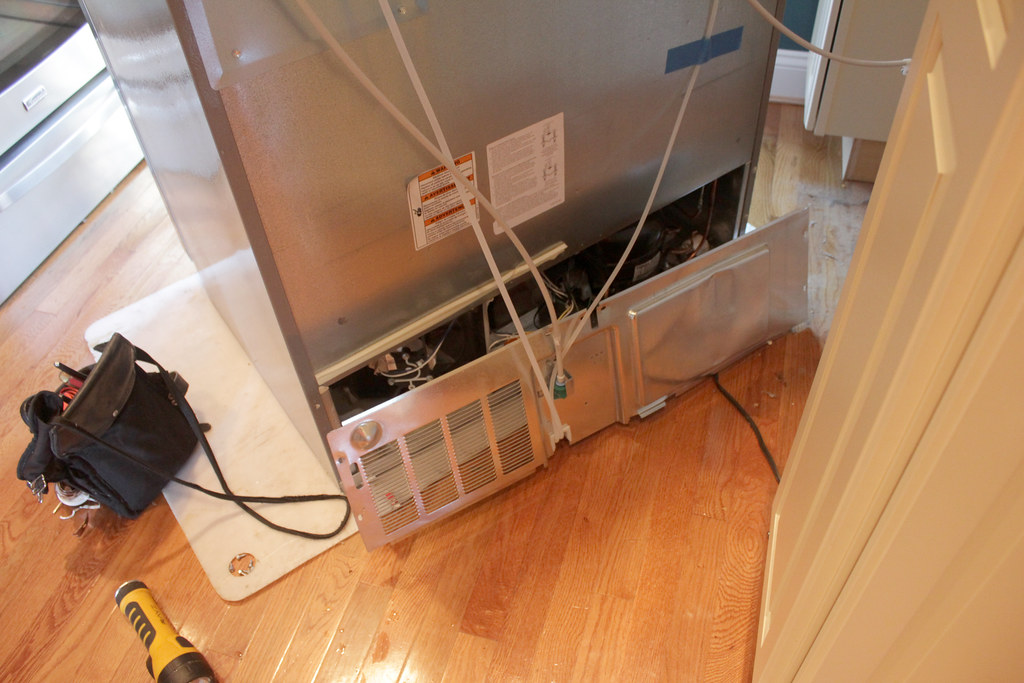How Hot Should A Fridge Compressor Get
A fridge compressor works by raising the pressure of the coolant, forcing it into a gaseous state, and pushing it through the coils on the appliance’s external rear. When this hot vapor is exposed to the cooler kitchen air, it cools down. As it continues its journey past the exposed coil and into the fridge, it cools down and, in turn, cools down the fridge’s interior. As the compressor heating up is a normal step in cooling down a fridge, you should expect it to get warm but not scalding hot.
Is It Dangerous When Your Fridge Compressor Is Running Too Hot
When your compressor feels excessively hot to the touch, it’s a matter that requires serious attention. If, for instance, you spot scorch marks on the walls behind the appliance, it’s crucial to disconnect the power source immediately due to the fire hazard it poses, presenting a potential danger to your family.
Fridge Compressor Is Hot: Is it precisely related to a malfunction of the compressor
Surprisingly, the fault may not be with your compressor at all. Several potential causes may be forcing it to run hot. We’ll explore each of them and look at what you can do when the compressor is the actual reason for the problems and how to fix them.
Troubleshooting Condenser Coils
The culprit might be your condenser coils heating up. If your fridge or freezer is in a dusty or dirty environment, it can gradually disrupt the efficient functioning of your appliance. The accumulation of dust and dirt on the condenser coil obstructs air circulation, leading to your compressor overheating. Using a vacuum, you should be able to clear away the dust, but it’s essential to approach it with caution to prevent permanent damage.
Troubleshooting a Condenser Fan Motor
Some sure-fire signals indicate your condenser fan motor is why the compressor on your fridge is hot. The fan will make a recognizable noise when it’s operating normally. If you don’t hear any sound, there’s a good chance there’s an issue with your fan. Before going any further, unplug your fridge. Moving your refrigerator away from the wall and looking at the fan is now safe.
If there’s excessive dust build-up, start by wiping it away with a cloth or vacuum. Next, try to spin the fan blades with your hands. If it moves easily, you should be okay to plug the fridge back in and try it. If your fridge begins to work and your compressor isn’t overly hot, it was likely just the excessive dust causing the problem.
Auto Defrost System Not Working Properly
Having a fridge or freezer with an auto-defrost feature is a nice thing to have. When it’s working as it should, you won’t have to worry about periodic defrosting sessions requiring you to empty your appliance first. When it stops working properly, it can cause a host of problems — one of them is causing your refrigerator compressor to run hot and preventing the cooling process from operating. This isn’t an easy fix, and we recommend seeking professional help.
But if the problem is something else?
Compressor On Refrigerator Is Hot: Other Reasons
Our refrigerators are essential for keeping our food fresh, but when the compressor starts to feel unusually hot, it’s a cause for concern. Understanding the potential reasons behind a hot compressor can be pivotal in resolving the issue and ensuring the longevity of your appliance.
Poor Air Circulation
The main reason why a compressor gets too hot is because of not enough air moving around. When there’s not enough airflow, the compressor has difficulty getting rid of heat, which can make it overheat. This can be attributed to a clogged condenser coil or obstructions hindering the fan blades responsible for circulating air within the fridge. A thorough cleaning of these components can restore your refrigerator’s performance.
Low Refrigerant Levels
Insufficient refrigerant levels in your fridge’s system can also lead to a hot compressor. Refrigerant plays a crucial role in cooling various fridge parts, including the compressor, by redirecting heat away from them. If the system lacks adequate refrigerant, it hampers its ability to operate efficiently, resulting in overheating and compromised cooling performance. To address this, seek the expertise of a professional technician to assess and replenish the refrigerant levels.
Malfunctioning Fridge Thermostat
A faulty thermostat can contribute to an overheating compressor, as it regulates the internal temperatures of the unit. When the thermostat malfunctions, it fails to maintain optimal temperatures, leading to excess heat buildup around components like compressors or fans, ultimately causing them to overheat. Replacing a faulty thermostat can resolve this issue, though professional assistance may be required if you’re uncomfortable with the task.
Excessive Load on the Fridge
Overloading your refrigerator with abundant food or items can strain its components, including the compressor. This strain arises from restricted airflow and limited space for proper cooling operations within the interior. To prevent this, exercise restraint in loading your device, ensuring ample space between items to facilitate unrestricted air circulation when the door(s) are opened and closed routinely.
Electrical Issues
Insufficient voltage supply is the most prevalent cause of a hot fridge compressor. When a refrigerator operates below optimal levels, it exerts extra effort to maintain cold temperatures, increasing energy consumption and heightened heat production within the unit. Even if your refrigerator seems to be cooling adequately, an underlying electrical problem can lead to excessive operation and unnecessary power consumption.
A Fridge Compressor Heating Up Too Much: When Should I Call Professional Repair Service
A professional repair service will be a good solution when in the following situations:
- Persistent Overheating. If the compressor consistently heats up excessively, and your attempts at troubleshooting and resolving the issue on your own have not been successful.
- Inadequate Cooling. When the refrigerator fails to maintain the desired temperature, the compressor continues to exhibit signs of overheating, indicating a potential underlying problem affecting the cooling efficiency.
- Unusual Noises. If you notice unusual or loud noises coming from the compressor, which persists despite your efforts to address the issue independently.
- Frequent Cycling. If the compressor cycles on and off more frequently than usual, and your attempts to stabilize its operation have not yielded positive results.
- Visible Leaks or Refrigerant Issues. The presence of refrigerant leaks or suspected problems within the refrigeration system, contributing to the compressor’s overheating, requires professional diagnosis and repair.
- Electrical Problems. If the overheating is linked to electrical malfunctions, such as faulty wiring or components, seeking professional repair services is crucial for safe and effective resolution.
- Odors or Smoke. The detection of unusual odors or smoke around the compressor signifies a serious problem that requires immediate attention from a professional technician.
- Warranty Concerns. If your refrigerator is still under warranty, contacting the manufacturer or an authorized repair service is recommended. Attempting DIY repairs could void the warranty, and professionals can ensure compliance with warranty terms.
But before ordering a professional repair service try to fix the problem by unplugging and defrosting the fridge. If your refrigerator compressor is running hot without visible burn signs, there might be a chance to address the issue independently. Begin by unplugging the appliance and letting it defrost for a few hours. Ensure you find an alternative spot for any perishables to prevent spoilage. If you lack an extra fridge, a cooler filled with ice is a viable alternative.
Once you’ve let your fridge defrost completely, clean the coils at the rear of the machine and any other dirt and debris around the compressor. Then try plugging your fridge back in and allow it an hour or so to cool down. If it appears to be working normally and the compressor is no longer extremely hot, you should be okay to move your food back inside.
Calling a professional fridge repair service at Fix Appliances CA in situations where you cannot cope ensures that the problem is accurately diagnosed and effectively addressed, minimizing the risk of further damage to your refrigerator and ensuring its optimal performance. Professional technicians have the expertise and tools necessary to handle complex compressor issues safely and efficiently.
Date of page creation: October 01, 2020
Page update date: March 20, 2024
What Our Customers Say About Us
Same-day Refrigerator Repair Service in Your Area
FIX Appliances CA is located in the north of Toronto, Ontario, and our local refrigerator repair technicians serving the GTA, Ottawa and southern Ontario. Check the map to confirm the service area nearest to your city or town.
Toronto & GTA Central Areas
Hamilton & GTA West Areas
Oshawa & GTA East Areas
Barrie & South Simcoe County
Collingwood & Grey County
Top Frequently Asked Questions
How Hot Should A Fridge Compressor Get?
Is It Dangerous When Your Fridge Compressor Is Running Too Hot?
What Should You Do When A Refrigerator Compressor Is Very Hot?
Step 2: Call Our Service Technician for an Expert Diagnosis: If the defrosting process doesn’t work for you, it’s probably time to call in professional help. You can contact us from 07:30 am to 9:00 pm for quick and expert service when you need it by calling 888-242-0777 or reaching out through a quote page. With more than 18+ years of experience, our technicians can diagnose and repair your appliance within 24 hours of your initial request.




